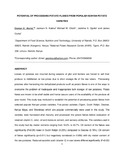| dc.description.abstract | Losses of potatoes are incurred during seasons of glut and farmers are forced to sell their produce to middlemen at low prices due to short storage life of the raw tubers. Processing potatoes after harvesting into dehydrated products such as potato flakes is one of the ways to overcome the problem of inadequate and inappropriate bulk storage of raw potatoes. Potato flakes are known to be shelf stable and hence assure users of the availability of the produce all year round. This study was instituted to establish the potential of processing potato flakes from selected popular Kenyan potato varieties. Five potato varieties (Tigoni, Dutch Robjin, Desiree, Kenya Mpya, and Sherekea) which are popular commercially were used in this study. The varieties were harvested after maturity and processed into potato flakes before evaluation of retained vitamin C, color, oil and moisture content, and sensory attributes. The varieties used in this study had dry matter contents ranging from 18.2% to 23.7%. Oil content of the flakes was significantly (P≤0.05) lower in Dutch Robjin (0.23%) compared to Desiree (0.76%). Oil content of flakes significantly (p=0.011) but negatively correlated (r=-0.956) with dry matter content of the raw potatoes. Reduced ascorbic acid (vitamin C) in raw tubers differed significantly (P≤0.05)
2
among the varieties ranging from 90.37 mg/100g in Kenya Mpya to 127.56 mg/100g in
Sherekea. The vitamin decreased in flakes, the reduction being higher in Kenya Mpya (60.34%)
and Sherekea (71.71%) compared to Tigoni (18.15%) and Desiree (23.26%). Overall, Dutch
Robjin was the best variety for flakes followed by Desiree and Tigoni with regard to overall
acceptability. Sherekea was unacceptable while Kenya Mpya was barely acceptable. Promotion
of these varieties for flakes processing will not only diversify the range of potato products, but
also add value to local potatoes.
. | en |

